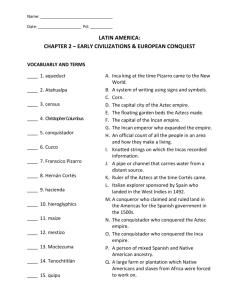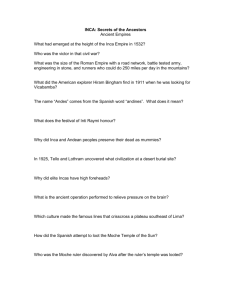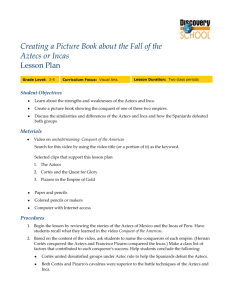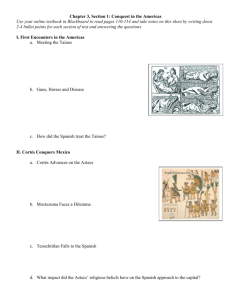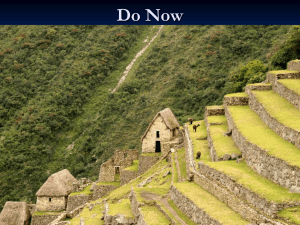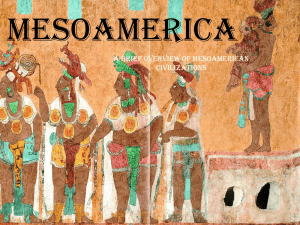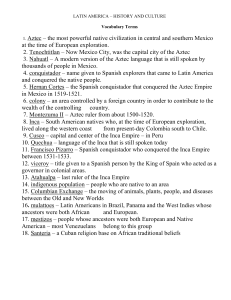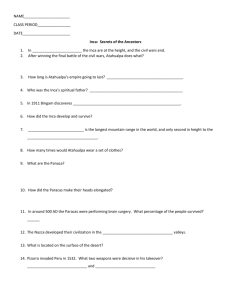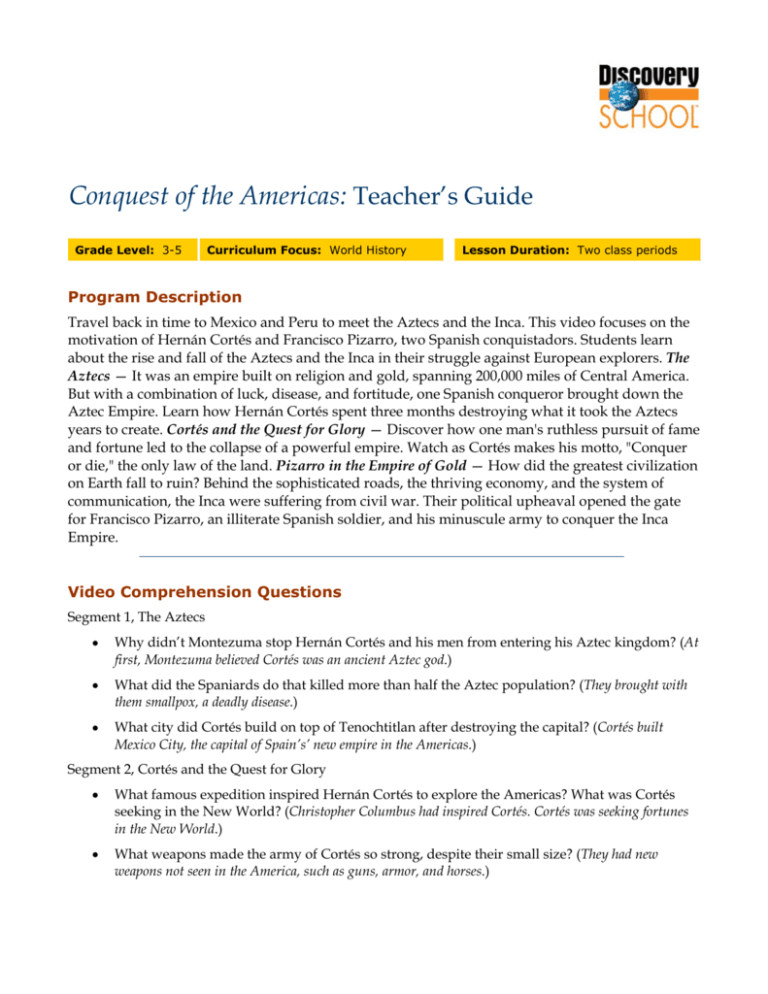
Conquest of the Americas: Teacher’s Guide
Grade Level: 3-5
Curriculum Focus: World History
Lesson Duration: Two class periods
Program Description
Travel back in time to Mexico and Peru to meet the Aztecs and the Inca. This video focuses on the
motivation of Hernán Cortés and Francisco Pizarro, two Spanish conquistadors. Students learn
about the rise and fall of the Aztecs and the Inca in their struggle against European explorers. The
Aztecs — It was an empire built on religion and gold, spanning 200,000 miles of Central America.
But with a combination of luck, disease, and fortitude, one Spanish conqueror brought down the
Aztec Empire. Learn how Hernán Cortés spent three months destroying what it took the Aztecs
years to create. Cortés and the Quest for Glory — Discover how one man's ruthless pursuit of fame
and fortune led to the collapse of a powerful empire. Watch as Cortés makes his motto, "Conquer
or die," the only law of the land. Pizarro in the Empire of Gold — How did the greatest civilization
on Earth fall to ruin? Behind the sophisticated roads, the thriving economy, and the system of
communication, the Inca were suffering from civil war. Their political upheaval opened the gate
for Francisco Pizarro, an illiterate Spanish soldier, and his minuscule army to conquer the Inca
Empire.
Video Comprehension Questions
Segment 1, The Aztecs
•
Why didn’t Montezuma stop Hernán Cortés and his men from entering his Aztec kingdom? (At
first, Montezuma believed Cortés was an ancient Aztec god.)
•
What did the Spaniards do that killed more than half the Aztec population? (They brought with
them smallpox, a deadly disease.)
•
What city did Cortés build on top of Tenochtitlan after destroying the capital? (Cortés built
Mexico City, the capital of Spain’s’ new empire in the Americas.)
Segment 2, Cortés and the Quest for Glory
•
What famous expedition inspired Hernán Cortés to explore the Americas? What was Cortés
seeking in the New World? (Christopher Columbus had inspired Cortés. Cortés was seeking fortunes
in the New World.)
•
What weapons made the army of Cortés so strong, despite their small size? (They had new
weapons not seen in the America, such as guns, armor, and horses.)
Conquest of the Americas: Teacher’s Guide
•
2
What was the personal motto of Hernán Cortez? (His personal motto was “Conquer or die.”)
Segment 3, Pizarro in the Empire of Gold
•
Where was the Inca Empire? (The Inca empire stretched 3,000 miles along the Andes Mountains in
South America.)
•
What two things were weakening the Inca empire about the same time that Pizarro arrived?
(The Inca emperor died and a power struggle had sparked a civil war. Also, smallpox brought by the
Spaniards was spreading across South America.)
Lesson Plan
Student Objectives
•
Learn about the strengths and weaknesses of the Aztecs and Inca.
•
Create a picture book showing the conquest of one of these two empires.
•
Discuss the similarities and differences of the Aztecs and Inca and how the Spaniards defeated
both groups.
Materials
•
Conquest of the Americas video and VCR, or DVD and DVD player
•
Paper and pencils
•
Colored pencils or makers
•
Computer with Internet access
Procedures
1. Begin the lesson by reviewing the stories of the Aztecs of Mexico and the Incas of Peru. Have
students recall what they learned in the video Conquest of the Americas.
2. Based on the content of the video, ask students to name the conquerors of each empire. (Hernán
Cortés conquered the Aztecs and Francisco Pizarro conquered the Incas.) Make a class list of
factors that contributed to each conqueror's success. Help students conclude the following:
•
Cortés united dissatisfied groups under Aztec rule to help the Spaniards defeat the
Aztecs.
•
Both Cortés and Pizarro's cavalries were superior to the battle techniques of the
Aztecs and Inca.
•
Smallpox and other European diseases contributed to diminishing the populations
of the Aztec and Inca Empires.
•
Much division within the Inca Empire worked to Pizarro's advantage.
Published by Discovery Education. © 2005. All rights reserved.
Conquest of the Americas: Teacher’s Guide
3
3. After students have become familiar with the key elements of each story, divide them into pairs.
Have each pair choose to focus on the Aztecs or Inca. Try to have an equal number of students
working on each story. Tell the pairs to develop picture books explaining how their group was
conquered. The pairs should be sure to cover the following points:
•
Strengths of the Aztecs or Inca
•
Weaknesses of the Aztecs or Inca
•
Reasons for Spanish victories
4. Give students time in class to research their topics and complete their picture books. Then have
each pair present their books to the class. Additional information is found at the Web sites
below.
•
Hernán Cortés
http://www.umich.edu/~proflame/texts/mirror/conflict.html
http://www.mexconnect.com/mex_/history/jtuck/jtcortes.html
http://www.virtualology.com/virtualmuseumofhistory/hallofexplorers/HERNANDOCORTES.
COM/
•
Francisco Pizarro
http://www.bruce.ruiz.net/PanamaHistory/francisco_pizarro.htm
http://www.ucalgary.ca/applied_history/tutor/eurvoya/inca.html
http://www.geocities.com/Athens/7012/bios/explorers/pizarro.htm
http://www.carpenoctem.tv/military/pizarro.html
5. Conclude the lesson by discussing differences and similarities between the Spaniards' treatment
of the Aztecs and Inca. In what ways were they similar? Which conquistador showed more
compassion? How did events beyond the Spaniards' control lead to their success?
6. Help students conclude that while Cortés showed somewhat more compassion for the Aztecs
than Pizarro did for the Inca, both greedy conquistadors were fighting to expand the Spanish
Empire. Their superior cavalries contributed to their success. The native groups were also
defeated by a smallpox epidemic, which killed thousands of people.
Assessment
Use the following three-point rubric to evaluate students' work during this lesson.
•
3 points: Students participate actively in class discussions; created highly attractive and
informative picture books based on research; and drew insightful conclusions based on the
lesson.
•
2 points: Students participated in class discussions; created attractive and somewhat
informative picture books based on some research, and drew some conclusions based on the
lesson.
•
1 point: Students did not participate in class discussions; did not complete their picture books;
and had difficulty drawing conclusions based on the lesson.
Vocabulary
Published by Discovery Education. © 2005. All rights reserved.
Conquest of the Americas: Teacher’s Guide
4
Aztecs
Definition: A Native American people who built an empire in Mexico that thrived during the
1400s and early 1500s
Context: Famine and disease contributed to the defeat of the Aztecs at the hands of the
Spaniards.
conquistador
Definition: The Spanish word for conqueror; the term refers to the first Europeans who entered a
region for the purpose of forcing the native peoples out and settling in the area.
Context: The conquistadors of Spain were famous for conquering New World empires and for
taking as much gold as they could.
Hernán Cortés
Definition: A Spanish conquistador who defeated the Aztecs in 1521
Context: Hernán Cortés forged an alliance among some Indian groups under Aztec control,
which helped him defeat this mighty empire.
Inca
Definition: A South American Indian people that established one of the largest and wealthiest
empires in the Americas. At its height, the empire extended more than 2,500 miles along the
western coast of South America.
Context: A key similarity between the Aztecs and Inca was a lack of unity among different
Indian groups that made up each empire.
Moctezuma
Definition: The Aztec emperor from 1502 to 1519
Context: Moctezuma's mistakes dealing with Cortés contributed to his death and the fall of the
Aztec Empire.
Francisco Pizarro
Definition: The Spanish conquistador who vanquished the Inca Empire in 1534
Context: Francisco Pizarro was a fierce and ruthless leader, determined to defeat the Inca and
take over their empire.
Academic Standards
The National Council for the Social Studies (NCSS)
The National Council for the Social Studies (NCSS) has developed national standards to provide
guidelines for teaching social studies. To view the standards online, go to
http://www.socialstudies.org/standards/strands/.
This lesson plan addresses the following thematic standards:
•
Culture
Published by Discovery Education. © 2005. All rights reserved.
Conquest of the Americas: Teacher’s Guide
•
Time, Continuity, and Change
•
Individuals, Groups, and Institutions
•
Power, Authority, and Governance
5
Support Materials
Develop custom worksheets, educational puzzles, online quizzes, and more with the free teaching tools
offered on the Discoveryschool.com Web site. Create and print support materials, or save them to a
Custom Classroom account for future use. To learn more, visit
•
http://school.discovery.com/teachingtools/teachingtools.html
Published by Discovery Education. © 2005. All rights reserved.

